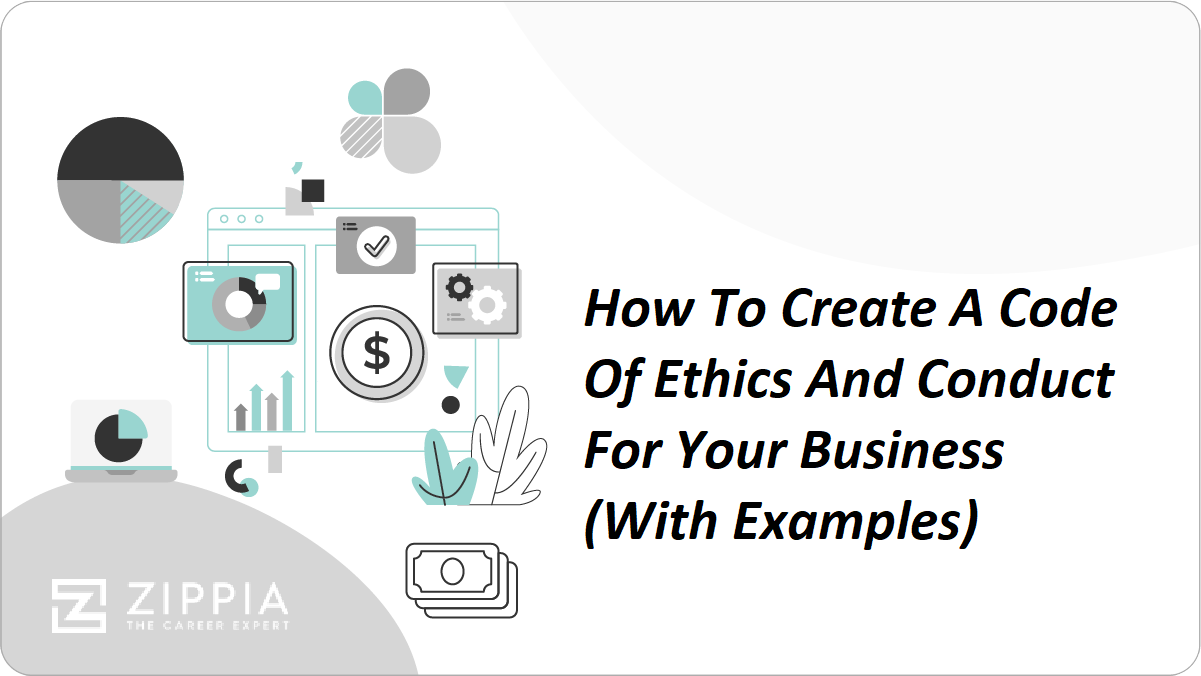Summary. The two different types of code of ethics are a business code of ethics and a personal code of ethics. To create a code of ethics and conduct a business should define the company’s priorities and principles for employees to follow. Codes of ethics can be compliance based, value based, or personal code of ethics.
Most employers typically have a code of ethics they expect their employees to follow. Utilizing a code of ethics in your business can help employees maintain a desired company culture while respecting their coworkers. A code of ethics is an important set of guiding principles that ensures your company functions the way its meant to.
Key Takeaways:
-
The three types of codes of ethics can be compliance based, value based, and personal.
-
Some common ethics that are shared by professionals can include honesty, loyalty, and integrity.
-
Issues that might fall under a business code of ethics could be things like employer-employee relations, discrimination, or sustainability.

Types of Codes of Ethics
As mentioned earlier in this article, a code of ethics can look different depending on the company. The overall goal is typically to ensure employees are following the law, conducting themselves professionally, and ensuring the business being conducted is up to a specific set of standards. Here are three types of codes of ethics that a business can create:
-
Compliance-Based Code of Ethics
For every organization, there are set laws that regulate things such as hiring practices and safety standards. Compliance-based codes of ethics help to establish guidelines for employee conduct and also determine appropriate penalties for individuals who violate this code.
Depending on the business’s industry, such as banking or healthcare, they may be required to follow additional laws and regulations. These specialized employees will undergo training to be informed of these rules, which is important to the businesses. Failure to follow these standards can often result in financial or legal penalties.
If the company is large enough, sometimes they’ll even have a role for a compliance officer who ensures the code of ethics is followed in all business practices. They may also be in charge of keeping up to date on any changes in regulation codes relevant to the industry or monitoring employee conduct.
A compliance-based code of ethics is based on clear-cut rules and well-defined repercussions for those who do not follow the guidelines. This can also mean some compliance-based codes of conduct do not discuss moral responsibility within the company, despite its strict adherence to laws and regulations.
-
Value-Based Code of Ethics
A value-based code of ethics is a code written with the company’s core value system in mind. This kind of code of ethics may outline specific standards of responsible conduct as it relates to the greater good or environmental factors. Because of this, these codes typically require more self-regulation from employees.
Some codes of ethics can refer to both compliance and values. For example, a clothing retailer may create a code of ethics that discusses the company’s commitment to high-quality fitness wear, as well as a statement that instructs purchasers not to contract with suppliers that use questionable labor methods to create their products.
-
Personal Code of Ethics
Personal ethics are a set list of principles an individual uses while making decisions or conducting their behavior in both personal and professional settings. These ethics can influence a person’s life and help them develop a work ethic, goals, and values. It will also help them discern right from wrong when faced with a challenge.
Personal codes of ethics can help leaders more effectively lead their teams as well as instill a sense of trust and support from their teams. A code of ethics greatly reduces the time it takes to make a decision and sets a standard of behavior for the individual and, oftentimes, those around them.
Examples of Code of Ethics
There are many different ways to create a code of ethics. Depending on what’s important to you and your organization, they may look different, but here are some common ethics shared by professionals:
-
Honesty. Honesty can be important in both business and personal experiences. Holding yourself and your employees to a standard where honesty is viewed as an important trait ensures teams can work through issues appropriately, problems are shared in a timely manner and establishes trust between all parties.
-
Loyalty. Being a trustworthy person or organization is an important trait to many. Loyalty is highly valued in relationships, whether they be professional or personal. By demonstrating fidelity in dealings in business or personal matters, you establish yourself or your business as trustworthy.
-
Integrity. Integrity, or the commitment to upholding moral principles in any situation, also contributes to trustworthiness in companies and individuals. Integrity means being reliable, responsible, and holding yourself accountable for your actions.
-
Respect. Although something we all hope is a basic principle for most can be important to include for many. Respect is an important ethic that is important in all relationships. At work, there are laws that require it, including respect for others’ autonomy, rights, and interests and not discriminating against someone’s religion, sex, or race.
What Is a code of ethics?
A code of ethics is a set of principles designed to guide professionals while conducting business to comply with set requirements to meet company standards. There are typically two different types of codes of ethics that are discussed — a business code of ethics and a personal code of ethics.
A business code of ethics is typically based on the core values of the organization. This may outline the mission or values of the business, how employees are expected to approach and solve problems, and outline the ethical principles based on the organization’s core values. It may also discuss the standards the company expects professionals to meet.
The code of ethics for each organization will be unique depending on their goals and what they hold with high significance. However, most codes of ethics reflect on a general idea of what general society considers right and wrong behavior, many times basing their code on societal expectations.
A code of ethics can also refer to a personal code of ethics. This will look different for every individual as our personal beliefs differ, but it can serve as an important foundation for an individual if they are ever in a morally uncertain situation. Having a concrete code of ethics can help them arrive at a path that aligns with what they believe in.
Understanding Codes of Ethics
In business, a code of ethics guides the overall operations. Issues that might fall under a business code of ethics could be things like employer-employee relations, discrimination, sustainability, bribery, insider training, and anything to do with social responsibilities. In order for this to be effective, it must be reinforced by leadership teams.
Code of ethics is law in many organizations, meaning if any employee acts in a way that doesn’t align with the code, they may be terminated or dismissed from the business. A code of ethics can be important for many people as it deliberately outlines rules for behavior and provides the groundwork for a preemptive warning if necessary.
Code of Ethics FAQ
-
What are the five codes of ethics?
The five codes of ethics are:
-
Integrity
-
Objectivity
-
Professional competence
-
Confidentiality
-
Professional behavior
These codes of ethics encompass many things that make a business successful and ensure employees are behaving in a way that satisfies the company’s legal requirements as well as the values they hold.
-
-
What are the eight codes of ethics?
The eight codes of ethics are:
-
Honesty
-
Integrity
-
Promise-keeping
-
Fidelity
-
Fairness
-
Respect for others
-
Responsible citizenship
-
Pursuit of excellence and accountability
This code of ethics dives into a bit more detail but still ensures it encompasses all things that help individuals behave in a way that the company or the individual is happy with.
-
-
What are the six codes of ethics?
The six codes of ethics are
-
Service
-
Social justice
-
Dignity and worth of the person
-
Importance of human relationships
-
Competence
Though these are typically used in social-type jobs, they encompass the importance of being kind to your fellow person, helping even if you receive nothing in return, and understanding how to do the job well.
-
Final Thoughts
A code of ethics is an important guide to help instruct professionals to behave in a way that is honest and beneficial to all involved in the business. If drafted by a business, the code of ethics will usually encompass any important specifics required by the industry it resides in to ensure all laws and regulations are met.
The moral choices for business have evolved significantly over many decades. In today’s environment, there is more emphasis on human working conditions, how businesses impact the environment, inequality, and better work-life balance. A code of ethics can help ensure a company satisfies these important things for their employees and customers.
References
- Workplace Policies
- How To Make An Equipment Policy
- Employee Break Laws
- Business Process Management
- Diversity in the Workplace
- Federal Holidays 2023
- Cell Phone Policy
- Attendance Policy
- Dress Code Policy
- Writing a Code of Conduct
- Company Mission Examples
- Putting Values Into Action
- Workplace Etiquette
- How to Reward Employees
- Employee Handbook
- Alternatives To All-hands Meetings
- Workplace Diversity
- Diversity Vs. Inclusion
- How To Outsource HR
- Strategic Planning
- Guide to Remuneration
- Bereavement Leave At Work
- How To Make A Sabbatical Policy
- How To Make A Moonlighting Policy
- How To Make An Open Door Policy
- How To Make A Human Resources Strategy
- How To Make A Vacation Policy
- How To Make A Remote Work Policy
- How To Create A Compensation Plan
- How To Organize Your Desk
- What Is Business Sustainability?
- How To Handle Proprietary Information
- Pets In The Office Policy
- How To Write A Social Media Policy
- How To Write Company Bylaws
- What Is VTO?
- Flexible Work Schedules





